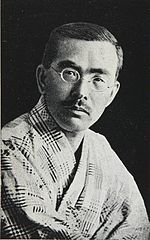Search results
Appearance
The page "Matsuo+Bashô" does not exist. You can create a draft and submit it for review or request that a redirect be created, but consider checking the search results below to see whether the topic is already covered.
- Matsuo Bashō (松尾 芭蕉, 1644 – November 28, 1694); born Matsuo Kinsaku (松尾 金作), later known as Matsuo Chūemon Munefusa (松尾 忠右衛門 宗房) was the most famous Japanese...37 KB (4,381 words) - 08:19, 31 October 2024
- Haikai (section Pre-Bashō Schools)derived its effect from satire and puns, though "under the influence of [Matsuo] Bashō (1644–1694) the tone of haikai no renga became more serious". "Haikai"...6 KB (802 words) - 10:53, 28 October 2024
- basho or bashō in Wiktionary, the free dictionary. Matsuo Bashō (1644–1694) was a Japanese Edo-period poet. Basho or Bashō may also refer to: Bashō (crater)...779 bytes (137 words) - 14:52, 27 November 2020
- Oku no Hosomichi (category Works by Matsuo Bashō)Road to the Interior, is a major work of haibun by the Japanese poet Matsuo Bashō, considered one of the major texts of Japanese literature of the Edo...14 KB (1,379 words) - 08:19, 18 May 2024
- Nozarashi Kikō (category Works by Matsuo Bashō)Matsuo Bashō. Written in the summer of 1684, the work covers Bashō's journey. According to translator Nobuyuki Yuasa, it is "the first work of Bashō where...4 KB (359 words) - 09:35, 11 April 2024
- Fukagawa, Tokyo (section Matsuo Bashō)Fukagawa is known for its relations to the famous Japanese poet, Matsuo Bashō. In 1680, Bashō moved to Fukagawa. Here, he wrote one of his most famous poems...7 KB (630 words) - 13:36, 8 July 2024
- featured in many literary and art works made by people such as poet Matsuo Basho, artist Hiroshige, and Edo period priest Anrakuan Sakuden. The term tororo...15 KB (1,472 words) - 02:05, 28 October 2024
- between Japan and Italy. Shimoi translated works from Yosano Akiko and Matsuo Bashō into Italian, and conversely translated Dante into Japanese. Shimoi was...8 KB (948 words) - 12:13, 7 November 2024
- that he changed his name to Basho, in honor of the Japanese poet, Matsuo Bashō. Basho saw the steel string guitar as a concert instrument, and wanted to...9 KB (926 words) - 03:59, 7 November 2024
- for its beauty and serenity by the wandering haiku poet Matsuo Bashō. The haiku poet Matsuo Bashō (1644–1694) wrote Oku no Hosomichi (The Narrow Road to...18 KB (1,463 words) - 23:11, 17 October 2024
- Takarai Kikaku (section Bashō's criticism)a Japanese haikai poet and among the most accomplished disciples of Matsuo Bashō. His father was an Edo doctor, but Kikaku chose to become a professional...4 KB (413 words) - 17:18, 28 October 2024
- Danrin school (section Bashō/Tosei)they ran the risk of ending up with mere frivolity. The renowned poet Matsuo Bashō had begun his poetic training in the Teimon school; but was much impressed...3 KB (363 words) - 01:10, 14 January 2023
- seventeenth-century (Edo period) Japanese poet and samurai who studied under Matsuo Bashō. Masahide practiced medicine in Zeze and led a group of poets who built...2 KB (150 words) - 18:56, 30 October 2024
- or of its later derivative, renku (haikai no renga). From the time of Matsuo Bashō (1644–1694), the hokku began to appear as an independent poem, and was...4 KB (537 words) - 02:38, 25 November 2023
- consider Shiki to be one of the four great haiku masters, the others being Matsuo Bashō, Yosa Buson, and Kobayashi Issa. Shiki, or rather Tsunenori (常規) as he...18 KB (1,952 words) - 09:41, 9 March 2024
- Musa basjoo (redirect from Musa basho)quenching thirst and disinhibiting urine. The 17th-century Japanese poet Matsuo Bashō took his pen name from this plant. A pseudostem is a false stem formed...7 KB (764 words) - 12:06, 18 October 2024
- 18th-century poetic travel diary Oku no Hosomichi, penned by the Japanese poet Matsuo Bashō. Dorrigo Evans has found fame and public recognition as a war veteran...14 KB (1,708 words) - 20:57, 2 November 2024
- footballer Ayumu Matsuo (松尾 歩, born 1980), Japanese shogi player Bashō Matsuo (松尾 芭蕉, 1644–1694), Japanese Edo period poet Erika Matsuo (松尾 依里佳, born 1984)...3 KB (399 words) - 18:47, 16 November 2024
- became popular and were key to the development and spread of ukiyozōshi. Matsuo Bashō (1644–1694) is recognized as the greatest master of haiku (then called...41 KB (4,908 words) - 20:15, 21 October 2024
- Frog Poem. Frog Poem by Matsuo Basho, translated by Basil Hall Chamberlain 2176677Frog PoemBasil Hall ChamberlainMatsuo Basho This work is a translation
- Matsuo Bashō (松尾芭蕉, 1644 – 28 November 1694) was a major Japanese poet, primarily known for his achievements in the haikai no renga and haiku (as it would
- (徒然草) - つれづれなるままに The Tale of the Heike (平家物語) - 祇園精舎の鐘の声 諸行無常の響きあり Matsuo Basho's Haiku The Tosa Diary (土佐日記) - 男もすなる日記といふものを、女もしてみむとてするなり。 Manyoshu (万葉集)










